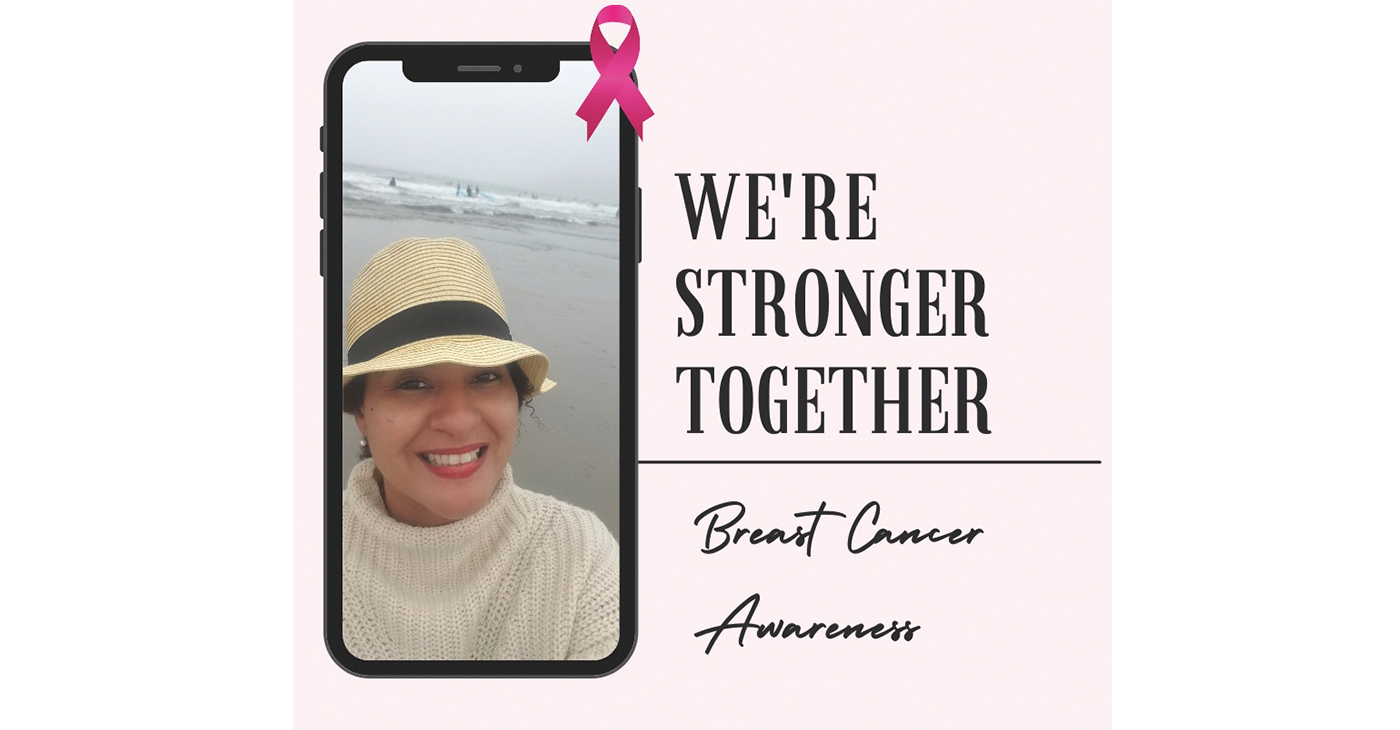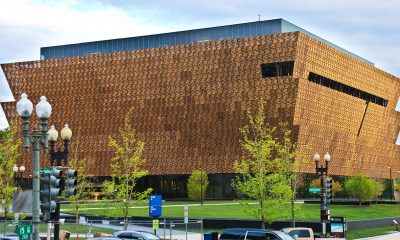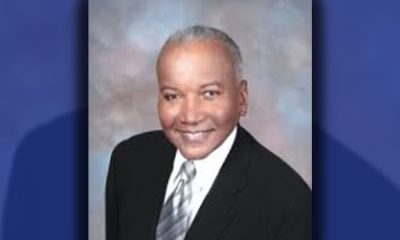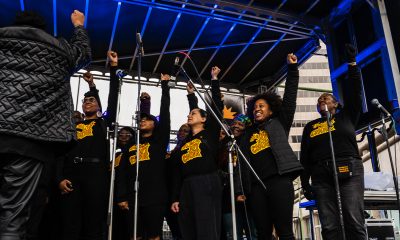Bay Area
Breast Cancer Risk Drives Lifestyle Changes for Charlotte Maxwell Clinic Volunteer
In my role as a driver for the Charlotte Maxwell Clinic, I feel patients are super excited to have someone who is compassionate and empathetic. Sometimes we talk about recipes and sometimes we talk about their previous experiences not related to cancer and that’s great because it’s like having that driver be your ‘friend’ for the moment to take your mind off having treatments.

PART III
By Michelle Meza with Melbra Watts
My son was going to college, and I was seeing my breast doctor and rambling on about my empty nest when she said ‘Why don’t you volunteer? You have time on your hands. Look into something you’re passionate about.’ I’d always volunteered and asked myself ‘what am I passionate about?’ And I realized it was staring me in the face—women’s health. I feel that my journey came full circle when I actually started to look for a place to volunteer.
I looked at multiple places here in the Bay Area, but I really loved the mission of the Charlotte Maxwell Clinic. What touched me was the story of how the Charlotte Maxwell Clinic came together. These women loved their friend so much that they rallied around her and were uplifting her to have the best treatments that they could possibly give her, and she was doing the same thing looking at research of what she could do to have a better quality of life and treatment and healing. That struck as a personal note to me; it touched my heart. Unfortunately, she did pass away but it was such a special story.”
Visiting the clinic, you instantly feel welcomed, loved, accepted. You’re not looked at any different from the color of your skin or your economic situation. Just, ‘we’re here to help.’”
I didn’t choose to become a driver; it was given to me.
In my role as a driver for the Charlotte Maxwell Clinic, I feel patients are super excited to have someone who is compassionate and empathetic. Sometimes we talk about recipes and sometimes we talk about their previous experiences not related to cancer and that’s great because it’s like having that driver be your ‘friend’ for the moment to take your mind off having treatments.
Maybe that person is having a bad day. I try to put myself in their shoes—if somebody were picking me up, what would I like somebody to do for me? ‘Would you like me to put some music on for you or would you like me to put the heated seat or AC on?’ And even if they don’t feel like talking, that’s totally fine. Perhaps they need a moment of silence, and this is for them to have their peace and get ready to have their treatment. I’ve always tried to make the patients feel welcome and as if they were a friend or family member.
I’m super passionate about working in the nonprofit world helping women any way possible. Being underprivileged and a woman of color is hard enough and to have health situations on top of that is even harder.
Charlotte Maxwell is a beacon for women who are going through their cancer journey, and that’s what drove me to volunteering with the clinic and that’s why I’m still there. I believe in the Clinic and think that somehow an endowment needs to come their way. The Clinic is a diamond in the rough; it’s helped so many women.
For the past 30 years, Charlotte Maxwell Clinic (CMC), the Oakland-based nonprofit women’s clinic, has been supplementing Bay Area low-income women’s standard cancer care with complementary therapies free of charge—including acupuncture, herbs, homeopathy, massage, guided imagery, movement, nutrition advice, and self-care education.
These services are made possible by a network of dedicated volunteers that include practitioners of holistic modalities, language interpreters, and drivers who use their own vehicles to transport clients to and from their CMC appointments.
Michelle Meza has been a driver with CMC since 2017. Melbra Watts is the executive director.
Activism
Asm. Corey Jackson Proposes Safe Parking for Homeless College Students Sleeping in Cars
Assemblymember Corey Jackson (D-Moreno Valley), a member of the California Legislative Black Caucus (CLBC), is the author of AB 90, which would require community colleges and California State University campuses to create overnight parking programs where students can sleep safely in their vehicles. With one in four community college students in California experiencing homelessness in the past year, Jackson says the state must act urgently.

By Bo Tefu
California Black Media
As California’s housing crisis continues to impact students, new legislation, Assembly Bill (AB) 90, promises to allow college students without stable housing to sleep in their cars on campus, offering a stark but practical solution aimed at immediate relief.
Assemblymember Corey Jackson (D-Moreno Valley), a member of the California Legislative Black Caucus (CLBC), is the author of AB 90, which would require community colleges and California State University campuses to create overnight parking programs where students can sleep safely in their vehicles. With one in four community college students in California experiencing homelessness in the past year, Jackson says the state must act urgently.
“This just deals with the harsh realities that we find ourselves in,” he said at a recent hearing.
The bill passed its first committee vote and is gaining attention as housing affordability remains a top concern across the state. California rents are more than 30% above the national average, and long waitlists for student housing have left thousands in limbo. CSU reported more than 4,000 students on its housing waitlist last year.
Supporters stress that the bill is not a long-term solution, but a humane step toward helping students who have no other place to go. A successful pilot program at Long Beach City College has already shown that safe, supervised overnight parking can work, giving students access to restrooms, Wi-Fi, and a secure environment.
However, the CSU and community college systems oppose the bill, citing funding concerns. Critics also worry about safety and oversight. But Jackson and student advocates argue the crisis demands bold action.
“If we know students are already sleeping in their cars, why not help them do it safely?” said Ivan Hernandez, president of the Student Senate for California Community Colleges.
Activism
Faces Around the Bay: Author Karen Lewis Took the ‘Detour to Straight Street’
“My life has been a roller-coaster with an unlimited ride wristband! I was raised in Berkeley during the time of Ron Dellums, the Black Panthers, and People’s Park. I was a Hippie kid, my Auntie cut off all our hair so we could wear the natural styles like her and Angela Davis.

By Barbara Fluhrer
I met Karen Lewis on a park bench in Berkeley. She wrote her story on the spot.
“My life has been a roller-coaster with an unlimited ride wristband! I was raised in Berkeley during the time of Ron Dellums, the Black Panthers, and People’s Park. I was a Hippie kid, my Auntie cut off all our hair so we could wear the natural styles like her and Angela Davis.
I got married young, then ended up getting divorced, raising two boys into men. After my divorce, I had a stroke that left me blind and paralyzed. I was homeless, lost in a fog with blurred vision.
Jesus healed me! I now have two beautiful grandkids. At 61, this age and this stage, I am finally free indeed. Our Lord Jesus Christ saved my soul. I now know how to be still. I lay at his feet. I surrender and just rest. My life and every step on my path have already been ordered. So, I have learned in this life…it’s nice to be nice. No stressing, just blessings. Pray for the best and deal with the rest.
Nobody is perfect, so forgive quickly and love easily!”
Lewis’ book “Detour to Straight Street” is available on Amazon.
Activism
Barbara Lee Accepts Victory With “Responsibility, Humility and Love”
“I accept your choice with a deep sense of responsibility, humility, and love. Oakland is a deeply divided City,” Lee said in an April 19 statement. “I answered the call to run to unite our community, so that I can represent every voter, and we can all work together as One Oakland to solve our most pressing problems.”

By Antonio Ray Harvey,
California Black Media
As a candidate for mayor, former U.S. Representative Barbara Lee released a “10-point plan” last week to reassure residents that she will tackle Oakland’s most pressing challenges.
Now that she has edged out her competitors in the ranked-choice special election with 50% or more of the vote, the former Congresswoman, who represented parts of the Bay Area in the U.S. House of Representatives, can put her vision in motion as the city’s first Black woman mayor.
“I accept your choice with a deep sense of responsibility, humility, and love. Oakland is a deeply divided City,” Lee said in an April 19 statement. “I answered the call to run to unite our community, so that I can represent every voter, and we can all work together as One Oakland to solve our most pressing problems.”
On Saturday evening, Taylor conceded to Lee. There are still about 300 Vote-by-Mail ballots left to be verified, according to county election officials. The ballots will be processed on April 21 and April 22.
“This morning, I called Congresswoman Barbara Lee to congratulate her on becoming the next Mayor of Oakland,” Taylor said in a statement.
“I pray that Mayor-Elect Lee fulfills her commitment to unify Oakland by authentically engaging the 47% of Oaklanders who voted for me and who want pragmatic, results-driven leadership.”
The influential Oakland Post endorsed Lee’s campaign, commending her leadership on the local, state, and federal levels.
Paul Cobb, The Post’s publisher, told California Black Media that Lee will bring back “respect and accountability” to the mayor’s office.
“She is going to be a collegial leader drawing on the advice of community nonprofit organizations and those who have experience in dealing with various issues,” Cobb said. “She’s going to try to do a consensus-building thing among those who know the present problems that face the city.”
Born in El Paso, Texas, Lee’s family moved to California while she was in high school. At 20 years old, Lee divorced her husband after the birth of her first child. After the split, Lee went through a tough period, becoming homeless and having to apply for public assistance to make ends meet.
But destitution did not deter the young woman.
Lee groomed herself to become an activist and advocate in Oakland and committed to standing up for the most vulnerable citizens in her community.
Lee traveled to Washington, D.C. to work for then U.S. Congressman Ron Dellums after receiving a Bachelor of Arts degree from Mills College in Oakland in 1973. Lee later won a U.S. Department of Housing and Urban Development (HUD) fellowship to attend the School of Social Welfare, and she earned a Master of Social Work from the University of California-Berkeley in 1975.
Lee later served in the California State Assembly and State Senate before she was elected to Congress in 1998.
After serving in the U.S. Congress for more than 25 years, Lee ran unsuccessfully for California’s U.S. Senate in the 2024 primary election.
Lee joins current Los Angeles mayor Karen Bass and former San Francisco Mayor London Breed as Black women serving as chief executives of major cities in California over the last few years.
-

 Activism4 weeks ago
Activism4 weeks agoOakland Post Endorses Barbara Lee
-

 Activism3 weeks ago
Activism3 weeks agoOakland Post: Week of April 2 – 8, 2025
-

 #NNPA BlackPress3 weeks ago
#NNPA BlackPress3 weeks agoTrump Profits, Black America Pays the Price
-

 Activism2 weeks ago
Activism2 weeks agoOakland Post: Week of April 9 – 15, 2025
-

 #NNPA BlackPress3 weeks ago
#NNPA BlackPress3 weeks agoHarriet Tubman Scrubbed; DEI Dismantled
-

 #NNPA BlackPress3 weeks ago
#NNPA BlackPress3 weeks agoTrump Targets a Slavery Removal from the National Museum of African-American History and Culture
-

 #NNPA BlackPress3 weeks ago
#NNPA BlackPress3 weeks agoLawmakers Greenlight Reparations Study for Descendants of Enslaved Marylanders
-

 #NNPA BlackPress3 weeks ago
#NNPA BlackPress3 weeks agoNew York Stands Firm Against Trump Administration’s Order to Abandon Diversity in Schools
























































